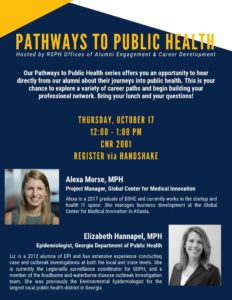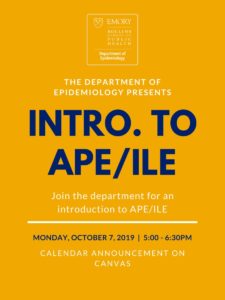Recent Publications Page
Category : News/Events
Check out the updated lists of publications from the Epidemiology Department on the Recent Publications page!
News, updates, and information for current students and alumni of the Department of Epidemiology at Rollins School of Public Health
Category : News/Events
Check out the updated lists of publications from the Epidemiology Department on the Recent Publications page!
Category : Student Opportunities
Universities Allied for Essential Medicines Emory chapter is recruiting board members for this academic year. Established in 2001, UAEM has grown into a worldwide student organization with chapters at over 100 research universities in more than 20 countries, and a membership which includes students of medicine, science, public health, economics, and many other areas. The focus of the organization has expanded from only asking how universities can best license their innovations to promote global access, to also asking how universities can best direct and measure their research to have the greatest social impact worldwide, and promoting these ideals at the national and international levels.
Website : https://uaem.org/
Facebook page : https://www.facebook.com/EmoryUAEM/
If you are interested in applying to the current open positions, please apply here: https://bit.ly/2mZPMW2
Like and follow their Facebook page for updates!
Category : GLEPI Student Opportunities
The Center for Global Data Visualization (CGDV) invites you to join an international data visualization hackathon! In this hackathon, we will provide you with data sets and the opportunity to visualize global, regional or country specific data related to refugees and displaced populations. You will have the opportunity to perform exploratory analysis and provide insights that can have a real impact to help refugees. Prizes will be provided for the winning visuals, and you can Register here to sign up. The Hackathon will take place from October 19 through the 26th.
Category : News/Events
Do you know how you are going to repay your student loans? Get your questions answered on income-based repayment, consolidation, public service loan forgiveness, deferment & forbearance and more!

Category : Alumni
The Pew Charitable Trusts uses data to make a difference. For more than 70 years, we have focused on serving the public, invigorating civic life, conducting nonpartisan research, advancing effective public policies and practices, and achieving tangible results. Through rigorous inquiry and knowledge sharing, we inform and engage public-spirited citizens and organizations, linking diverse interests to pursue common cause. We are a dedicated team of researchers, communicators, advocates, subject matter experts, and professionals working on today’s big challenges – and we know we are more effective and creative collectively than we are individually. With Philadelphia as our home town and the majority of our staff located in Washington, DC, our U.S. and international staff find working at Pew personally and professionally rewarding.
Wise stewardship of resources allows Pew employees to pursue work that strategically furthers our philanthropic mission in significant and measurable ways. We collaborate with a diverse range of philanthropic partners, public and private organizations, and concerned citizens who share our interest in fact-based solutions and goal-driven investments to improve society. Pew attracts top talent, people of integrity who are service-oriented and willing to take on challenging assignments. We provide competitive pay and benefits, a healthy work-life balance, and a respectful and inclusive workplace. Pew employees are proud of their colleagues, proud of where they work, and proud of the institution’s reputation.
The Government Performance Portfolio within Program
Government performance, one of the five program portfolios at The Pew Charitable Trusts, identifies and advances effective approaches to improve policy at all levels of government. The portfolio’s project teams conduct research on emerging topics, develop data-driven reports, and highlight innovative approaches in addressing complex problems. Initiatives currently focus on three key areas for federal, state, and local governments: (1) health and human services; (2) management and budget; and (3) safety and justice.
GP utilizes the basic tools required to explore and advance effective policy solutions at the federal, state, and local levels. These solutions include credible, timely, and user-friendly research; assessments of public support for change; strategic outreach and dissemination to ensure that good information is widely communicated to decision-makers, media, influential stakeholders, and the public; the capacity to bring together diverse perspectives and find common ground; and the ability to identify and apply approaches that have proven successful elsewhere.
The GP portfolio is led by the vice president and head of government performance, with support from a vice president and senior directors who provide oversight over select projects and functions within the portfolio.
Antibiotic Resistance Project
Pew’s antibiotic resistance project supports policies and research that would spur the creation of new antibiotics, establish stewardship programs to ensure that antibiotics are prescribed only when necessary in human health care settings, and reduce the need for antibiotics in food animals. Follow this link for more information: https://www.pewtrusts.org/en/projects/antibiotic-resistance-project
Position Overview
The senior associate, based in Pew’s Washington, DC office, informs and influences public policy by providing research and programmatic support to achieve the goals of the project. This includes developing subject matter expertise in the use of antibiotics in food animal production; taking a lead role in the execution of the project’s research and outreach goals; analyzing policies to phase out the overuse of antibiotics in food animals; and assisting with stakeholder convenings and communications. Reporting to the manager, antibiotic resistance project, the senior associate works closely with the senior officer, health program, and other Pew colleagues in communications, research, government relations, and other areas. The position has a set time frame that could be extended based on the success of the program, funding sources, and board decisions on continued support.
Responsibilities
Under the direction of the manager and guidance of other staff (specifically, the senior officer, health program):
Develop relevant subject matter expertise:
Develop a broad knowledge of issues related to antibiotic stewardship in animal agriculture.
Track trends regarding animal antibiotic use.
Proactively identify and monitor the relevant positions of influential stakeholders and thought leaders.
Contribute to research and publication efforts:
Conduct literature reviews, qualitative research, and data analysis.
Track development and implementation of relevant public policy.
Draft fact sheets, issue briefs, Web features, and other publications.
Confirm accuracy of products and publications through quality-control and fact-check processes.
Contribute to policy advocacy and outreach efforts:
Collaborate with communications and government relations colleagues to generate materials and presentations for outreach to the media, policymakers, and key stakeholders and ensure that materials are timely, accurate, and relevant.
Assist in planning, organizing, and coordinating in-person and online convenings of key stakeholders.
Contribute to and participate in tasks of the project and department as assigned, as well as broader Pew-wide projects and committees as needed.
Requirements
Bachelor’s degree in a research or policy-related discipline required. Professional or advanced degree in public policy, veterinary science, or research-related field preferred.
At least four years of applicable experience in research or public policy.
Prior to commencing employment with Pew, candidates for this position who were registered to lobby in any jurisdiction must certify termination of previous registration(s) and provide copies of termination notices with said jurisdiction(s) to Pew.
Knowledge of animal production systems or current policy and research on antibiotic use, particularly in food animal production, is preferred.
Excellent applied research and analytical skills, including a proven ability to comprehend scientific research, synthesize large amounts of scientific information, identify themes, and present the information to an informed general audience.
Ability to focus quickly on the essence of an issue, as well as to identify, understand, and synthesize different policy perspectives.
Excellent oral communication skills, including an ease in conveying complex concepts and issues in a clear, effective manner for policy and general audiences.
Excellent written and editing skills, including a proven ability to learn and adopt new writing styles as required.
Demonstrated project- and time-management skills, including the ability to think strategically, juggle multiple priorities, adjust to changing circumstances, resolve problems creatively and logically, organize time efficiently and remain attentive to details.
Ability to work professionally and collegially within a creative, fast-paced corporate culture that emphasizes excellence and teamwork.
To apply, click HERE.
Category : GLEPI News/Events
On Thursday, October 17, two of Rollins alumni will be returning to campus to speak at Pathways to Public Health. Alexa Morse is a 2017 BSHE graduate and currently working at the Global Center for Medical Innovation. Liz Hannapel is a 2012 EPI alumna and works with the GA Department of Public Health. Come hear about their pathway to public health and explore a variety of career options!
Category : Alumni
Department: Obstetrics & Gynecology
Responsible for all aspects of research projects and research facilities. Plans and conducts clinical and non-clinical research; facilitates and monitors daily activities of clinical trials or research projects. Directs engineering and technical support activities to develop and maintain tools and computational methods needed to gather and analyze data.
Conducts data investigation, including data wrangling, cleaning, sampling, management, exploratory analysis, regression and classification, prediction, and data communication. Implements foundational concepts of data computation, such as data structure, algorithms, parallel computing, simulation, and analysis. Utilizes knowledge in game theory, statistical quality control, exponential smoothing, seasonally adjusted trend analysis, or data visualization to gain insights, develop new strategies, and cultivate actionable business intelligence in diverse career tracks across the University.
P3: Requires in-depth knowledge and experience. Uses best practices and knowledge of internal or external University issues to improve products or services. Solves complex problems; takes a new perspective using existing solutions. Works independently, receives minimal guidance. Acts as a resource for colleagues with less experience.
Responsibilities
The job uses best practices and knowledge of data manipulation, statistical applications, programming, analysis and modeling in order to implement projects related to the University’s various internal data systems as well as from external sources. The job is responsible for managing operational protocols.
1) Has a deep understanding of methods to analyze complex data sets for the purpose of extracting and purposefully using applicable information. May develop and maintain infrastructure that connects data sets., 2) Guides staff or faculty members in defining the project and applies principals of data science in manipulation, statistical applications, programming, analysis and modeling., 3) Calibrates data between large and complex research and administrative datasets. Guides and may set the operational protocols for collecting and analyzing information from the University’s various internal data systems as well as from external sources., 4) Designs and evaluates statistical models and reproducible data processing pipelines using expertise of best practices in machine learning and statistical inference. Provides expertise for high level or complex data-related requests and engages other IT resources as needed. Partners with other campus teams to assist faculty with data science related needs., 5) Performs other related work as needed.
Unit-specific Responsibilities
1) Perform significant leadership and creative role in the design, development and execution of quantitative studies using observational, quasi-experimental, experimental and simulation designs as appropriate.
2) Manage and develop a team of masters and more junior-level analysts (biostatistics, informatics, public health, MD-trained analysts) and trainees, including providing support, mentorship and duplicating analyses
3) Lead the writing of the study design and analytic components of proposals, manuscripts and other dissemination materials. Prepare tables and figures for manuscripts, abstracts, and other scientific publications, contributing as author or co-author
4) Oversee development, management and integrity of all research databases, including maintaining and documenting source code for reproducibility of research.
5) Oversee and conduct preparation of datasets for analysis
6) Apply high-level research and writing skills in combination with data analysis skills to ensure timely and effective dissemination of study findings.
7) Identify appropriate statistical methods to address research hypotheses and conduct statistical analyses accordingly. Provide statistical analysis and data management for multiple NIH and other funded projects, including randomized controlled trials, longitudinal intervention studies, network studies of information-based and clinical interventions
8) Participate in regular meetings to discuss proposed analyses, share code and analytic approaches, and discuss data and/or methodological challenges as they arise.
Unit-preferred Competencies
1) Demonstrated ability in effective management and training of analysts
2) Demonstrated success in development and writing of federal (especially NIH) and other funding proposals
3) Demonstrated skills using analytic software including STATA or the equivalent required; ArcGIS preferred; social network, systems science, machine learning, predictive analytics experience a plus
4) Proficiency with Microsoft applications, including but not limited to Outlook, Excel, Access and Word
5) Ability to adhere to protocols for maintaining confidentiality of protected health information, and work with sensitive information
6) Meticulous attention to detail and excellent organizational skills.
7) Ability to work on multiple projects simultaneously, set priorities, and meet deadlines.
8) Excellent interpersonal skills and the ability to work both independently and as part of a team.
9) Demonstrated written and verbal communication skills, including ability to communicate results from complex statistical analyses to a lay audience.
10) Flexibility, creativity, and problem solving skills.
11) Ability to collaborate with colleagues from diverse academic and professional backgrounds.
12) Demonstrated effective leadership skills and ability to manage new analysts or students
For more information and to apply, click HERE.
Category : Alumni
Description
The Senior Behavioral Economics Professional in Clinical Data Science team designs, executes, and measures the results of large scale experiments. The Senior Behavioral Economics Professional work assignments involve moderately complex to complex issues where the analysis of situations or data requires an in-depth evaluation of variable factors.
Responsibilities
Digital Health and Analytics is a new area of Humana, focused on transforming the health experience for Humana members through the use of technology and analytics. We are looking for a Behavioral Economics Professional to assist in transforming Humana into a best in class Test and Learn organization, using both Behavioral Economics theory and Design of Experiment expertise to design rigorous business experiments that will inform Humana’s strategy moving forward.
The Behavioral Economics Professional will work cross-functionally and collaboratively with teams across Humana in the design, execution, and analysis of business experiments, with emphasis on randomized control studies when appropriate. To enable Humana’s transformation to a best in class testing organization, the Behavioral Economics Professional will guide Business Partners for the Clinical Data science team through a new process that makes it easy for teams to navigate the complexity of testing in a large organization with regards to legal, compliance, and other regulatory oversight.
The ideal candidate will have experience conducting experiments in an applied healthcare setting and have demonstrated innovation and creative methods for overcoming testing constraints.
As a Behavioral Economics Professional, you will:
guide Business Partners through a new Test and Learn process that makes it easy for teams to navigate the complexity of testing in a large organization with regards to legal, compliance, and other regulatory oversight
provide regular reporting of the Test and Learn landscape at Humana
work with Business Partners to clearly define hypotheses and design rigorous tests that allow confidence in the results
provide recommendations for sample sizing through power analysis
apply Behavioral Economics theory to the design of interventions
build strong working relationships with a variety of teams in a collaborative, matrixed environment with physical locations across the U.S.
design, conduct, analyze, and provide recommendations for the interpretation of results of business experiments
First Year Success Factors
You communicate effectively and timely with Business Partners engaged in the Test and Learn process.
You are recognized as an experimentation expert by Business Partners.
You are able to identify innovative methods for overcoming testing constraints.
You have developed effective partnerships with business partners and coworkers.
Required Qualifications
Bachelor’s Degree in Economics, Behavioral Sciences, Applied Statistics, Public Health or related field
Experience conducting lab or field experiments
Experience working with and analyzing various types of data using SAS, R, Python or similar software
History of solving problems, creating solutions and driving change within a team
Naturally curious and comfortable with ambiguity
Demonstrated strategic and analytical thinking
Clear and concise oral and written communication skills
Strong interpersonal and consulting skills
Preferred Qualifications
Master’s or PhD Degree in Economics, Behavioral Sciences, Applied Statistics, Public Health or related field
1-3 years of work experience in healthcare, insurance, or related field
Experience conducting microeconomic or behavioral science research
Previously applied research to help a firm reach objectives
Work experience in a health care and/or Insurance setting
To apply, click HERE.
Category : Student Opportunities
Submit your abstract for the 2019 Place & Health Conference by Friday, September 27, 2019!
Are you interested in sharing your geospatial work, research, and accomplishments with your public health colleagues? GeoSWG is actively soliciting abstracts for the following presentation opportunities during the 2019 Place & Health Conference:
· Map Gallery
· 5 Minute Lightning Talks
· 15-20 Minute Presentations
· Panel Presentations
To register to attend the 2019 Place & Health Conference, click HERE. Once you’ve registered, submit an abstract at HERE. The deadline to submit an abstract is Friday, September 27, 2019.
The 2019 Place & Health Conference will take place on November 14-15, 2019 at the CDC Global Communications Center, Roybal Campus. The 2019 Place & Health Conference is a free event and is open to CDC/ATSDR employees and contractors, academic and government partners, public health and GIS professionals, and students.
This year’s theme is Vulnerable Populations. Through the application of geospatial technology and methods we can increase our understanding of the locations where disasters or disease occurrence may have a disproportionate effect on the health of the population. This knowledge can be used to enhance health promotion, disease prevention, and emergency preparedness activities which are the essence of public health.
Visit https://placeandhealthconference.com for more information. Please reach out to GeoSWG [at] cdc [dot] gov with questions.
Category : News/Events

Join the Epidemiology Department for the Introduction to APE/ILE on October 7 from 5-6:30pm.
Recent Comments